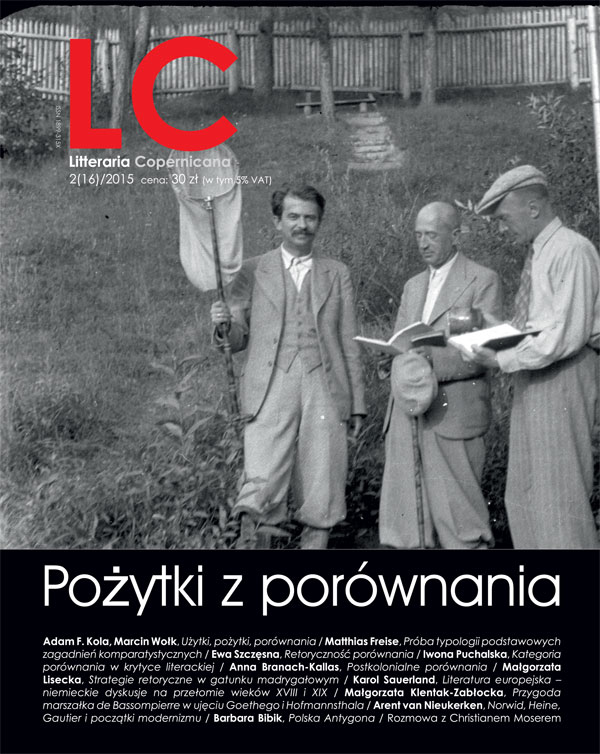Translating cultures?: postcolonial comparisons
DOI :
https://doi.org/10.12775/LC.2015.018Mots-clés
postcolonialism, translating cultures, colonial discourse, trauma, intertextuality, valueRésumé
Comparison is a conceptual tool often used in postcolonial studies, juxtaposing phenomena and artefacts being the products of different cultural codes. In a global and multicultural world such an analysis might seem a simple interpretative procedure. However, since the 1950s a thorough transformation of the comparative practice can be observed in English postcolonial theory and criticism. The article is an attempt to discuss these changes, while putting into question the problem of translating cultures. The theoretical introduction is followed by an intertextual interpretation of two contemporary postcolonial novels: The Wide Sargasso Sea by Jean Rhys, which was inspired by Charlotte Bronte’s Jane Eyre, and Foe by John Maxwell Coetzee, which revisions Daniel Defoe’s Robinson Crusoe. The author concludes by exploring cultural appropriation in the context of deterritorialization and globalization, attempting to define new ways of approaching comparison in postcolonial studies.
Références
Achebe Chinua, An Image of Africa: Racism in Conrad’s „Heart of Darkness”, kirbyk.net/hod/image.of.africa.html (dostęp: 22.09.2015).
Achebe Chinua, Colonialist Criticism, [w:] The Post-colonial Studies Reader, red. Bill Ashcroft, Gareth Griffiths, Helen Tiffin, London–New York: Routledge, 1999.
Appadurai Arjun, Nowoczesność bez granic. Kulturowe wymiary globalizacji, tłum. Zbigniew Pucek, Krakow: Universitas, 2005.
Barth John, The Literature of Exhaustion, [w:] The Novel Today: Contemporary Writers on Modern Fiction, red. Malcolm Bradbury, Glasgow: Fontana, 1977.
Bhabha Homi K., Miejsca kultury, tłum. Tomasz Dobrogoszcz, Krakow: Wydawnictwo Uniwersytetu Jagiellońskiego, 2010.
Bordo Susan, Unbearable Weight: Feminism, Western Culture and the Body, Berkeley–Los Angeles–London: University of California Press, 1995.
Branach-Kallas Anna, Uraz przetrwania. Trauma i polemika z mitem pierwszej wojny światowej w powieści kanadyjskiej, Toruń: Wydawnictwo Naukowe Uniwersytetu Mikołaja Kopernika, 2014.
Bronte Charlotte, Jane Eyre, Harmondsworth: Penguin Books, 1962 (wyd. polskie: Jane Eyre, tłum. Teresa Świderska, Warszawa: Proszyński Media, 2011).
Caruth Cathy, Trauma and Experience: Introduction, [w:] Trauma: Explorations in Memory, red. Cathy Caruth, Baltimore–London: Johns Hopkins University Press, 1995.
Coetzee John Maxwell, Foe, New York: Viking, 1987 (wyd. polskie: Foe, tłum. Magdalena Konikowska, Krakow: Znak, 2007).
Craps Stef, Buelens Gert, Introduction: Postcolonial Trauma Novels, „Studies in the Novel” 2008, t. 40, nr 1/2, s. 2.
Defoe Daniel, The Life and Adventures of Robinson Crusoe, Harmondsworth: Penguin Books, 1985 (wyd. polskie: Przypadki Robinsona Kruzoe, tłum. Jozef Birkenmajer, Wrocław: Wydawnictwo Dolnośląskie, 2002).
Drabble Margaret, Stringer Jenny, The Concise Oxford Companion to English Literature, Oxford–New York: Oxford University Press, 1987.
Gandhi Leela, Teoria postkolonialna. Wprowadzenie krytyczne, tłum. Jacek Serwański, Poznań: Wydawnictwo Poznańskie, 2008.
Gilman Sander L., Black Bodies, White Bodies: Toward an Iconography of Female Sexuality in Late Nineteenth-Century Art, Medicine, and Literature, [w:] „Race”, Writing, and Difference, red. Henry Louis Gates, Jr., Chicago–London: University of Chicago Press, 1986.
JanMohamed Abdul R., The Economy of Manichean Allegory: The Function of Racial Difference in Colonialist Literature, [w:] „Race”, Writing, and Difference, red. Henry Louis Gates, Jr., Chicago–London: University of Chicago Press, 1986.
Jenny Laurent, Strategia formy, tłum. Krystyna i Jerzy Faliccy, „Pamiętnik Literacki” 1988, z. 1.
Kincaid Jamaica, A Small Place, New York: Farrar, Straus, Giroux, 1988.
King Thomas, Godzilla vs. Post-Colonial, [w:] Unhomely States: Theorizing English-Canadian Postcolonialism, red. Cynthia Sugars, Peterborough: Broadview Press, 2004.
Kołodziejczyk Dorota, Postkolonialne odzyskiwanie pamięci: zawłaszczenia, fabulacje, niesamowite dopominanie, [w:] Od pamięci biodziedzicznej do postpamięci, red. Teresa Szostek, Roma Sendyka i Ryszard Nycz, Warszawa: Instytut Badań Literackich PAN, 2013.
Kołodziejczyk Dorota, Wojna światów? Postkolonialny kontrapunkt w nowej komparatystyce, „Teksty Drugie” 2014, nr 4.
Kristeva Julia, Potęga obrzydzenia. Esej o wstręcie, tłum. Maciej Falski, Krakow: Wydawnictwo Uniwersytetu Jagiellońskiego, 2007.
Lamming George, The Pleasures of Exile, London: Michael Joseph, 1960.
Lewis Herman Judith, Przemoc. Uraz psychiczny i powrót do równowagi, tłum. Anna i Magdalena Kacmajor, Gdańsk: Gdańskie Wydawnictwo Psychologiczne, 2007.
Loomba Ania, Kolonializm/postkolonializm, tłum. Natalia Bloch, Poznań: Wydawnictwo Poznańskie, 2011.
Macaulay Thomas, Minute on Indian Education, [w:] The Post-colonial Studies Reader, red. Bill Ashcroft, Gareth Griffiths, Helen Tiffin, London–New York: Routledge, 1999.
McClintock Anne, Imperial Leather: Race, Gender and Sexuality in the Colonial Contest, New York–London: Routledge, 1995.
McLeod John, Beginning Postcolonialism, Manchester–New York: Manchester University Press, 2000.
Meyer Susan L., From „Colonialism and the Figurative Strategy of Jane Eyre”, [w:] Post-Colonial Theory and English Literature, red. Peter Childs, Edinburgh: Edinburgh University Press, 1999.
Ngũgĩ wa Thiong’o, Decolonising the Mind: The Politics of Language in African Literature, London: James Currey, 1986.
Phillips Richard, Mapping Men and Empire: A Geography of Adventure, London: Routledge, 1997.
Pratt Mary Louise, Imperialne spojrzenie: pisarstwo podróżnicze a transkulturacja, tłum. Ewa Elżbieta Nowakowska, Krakow: Wydawnictwo Uniwersytetu Jagiellońskiego, 2011.
Rhys Jean, Wide Sargasso Sea, London: Deutsch, 1966 (wyd. polskie – Szerokie Morze Sargassowe, tłum. Maryla Topczewska-Metelska, Krakow: Wydawnictwo Literackie, 1987).
Rothberg Michael, Między Paryżem a Warszawą. Pamięć wielokierunkowa, etyka i odpowiedzialność historyczna, tłum. Tomasz Bilczewski i Anna Kowalcze-Pawlik, [w:] Od pamięci biodziedzicznej do postpamięci, red. Teresa Szostek, Roma Sendyka i Ryszard Nycz, Warszawa: Instytut Badań Literackich PAN, 2013.
Said Edward W., Kultura i imperializm, tłum. Monika Wyrwas-Wiśniewska, Krakow: Wydawnictwo Uniwersytetu Jagiellońskiego, 2009.
Said Edward W., Orientalizm, tłum. Monika Wyrwas-Wiśniewska, Poznań: Zysk i S-ka, 2005.
Slemon Stephen, Unsettling the Empire: Resistance Theory for the Second World, [w:] The Post-colonial Studies Reader, red. Bill Ashcroft, Gareth Griffiths, Helen Tiffin, London–New York: Routledge, 1999.
Spivak Gayatri Chakravorty, A Critique of Postcolonial Reason: Toward a History of the Vanishing Present, Cambridge–London: Harvard University Press, 1999.
Spivak Gayatri Chakravorty, Death of a Discipline, New York–Chichester: Columbia University Press, 2003.
Spivak Gayatri Chakravorty, Komparatystyka ekstremalna, tłum. Dorota Kołodziejczyk, „Recykling Idei” 2008, nr 10 (wiosna/lato).
Spivak Gayatri Chakravorty, Three Women’s Texts and a Critique of Imperialism, [w:] „Race”, Writing, and Difference, red. Henry Louis Gates, Jr., Chicago–London: University of Chicago Press, 1986.
Stepan Nancy Leys, Race and Gender: The Role of Analogy in Science, [w:] Anatomy of Racism, red. David Theo Goldberg, Minneapolis–London: University of Minnesota Press, 1990.
Tiffin Helen, Post-colonial Literatures and Counter-discourse, [w:] The Post-colonial Studies Reader, red. Bill Ashcroft, Gareth Griffiths, Helen Tiffin, London–New York: Routledge, 1999.
Téléchargements
Publiée
Comment citer
Numéro
Rubrique
Stats
Number of views and downloads: 1379
Number of citations: 0



